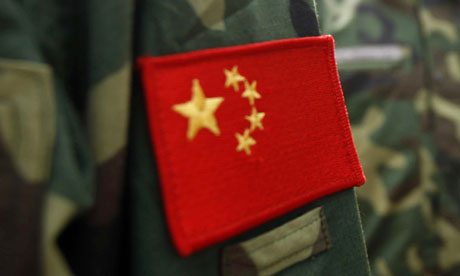China and South Korea will keep pushing to end North Korea’s nuclear program, their leaders declared Thursday at a high-profile summit between Pyongyang’s closest ally and its key rival.
“We have agreed that under any circumstances, North Korea’s nuclear (weapons) are unacceptable and confirmed that the denuclearization of the Korean peninsula is of common interest for the two countries,” South Korean President Park Geun-Hye told reporters as she sat beside Chinese President Xi Jinping.
Park made the remarks after a summit meeting in Beijing, where Xi greeted her as “an old friend of China” and granted her full military honors before the pair witnessed the signing of trade and other agreements.
“We on both sides consistently agree to continue to realise the denuclearization of the Korean peninsula and firmly protect peace and stability on the peninsula,” Xi said, though he avoided singling out North Korea by name.
China has previously supported North Korea’s denuclearization and is the chair of a multinational forum — the six-party talks — aimed at achieving it, but has also tended to prioritize regional stability, for decades acting as the sole major ally and economic lifeline to the unpredictable North.
South Korea, which does not have nuclear weapons, and ally the United States, have made it clear they will never accept the idea of North Korea as a nuclear state, and insist Pyongyang must show a tangible commitment to abandoning its nuclear weapons if it wants substantive talks.
Both have pressured China to use more of its leverage to rein in Pyongyang.
Xi, for his part, described the situation on the divided peninsula as “currently changing in a positive direction”, apparently referring to recent offers by Pyongyang to pursue dialogue, including hinting at a return to long-stalled six-nation nuclear talks aimed at shuttering its nuclear program.
“We hope all sides can seize this opportunity to work to return to the six party talks as soon as possible,” he said.
The forum — which groups North Korea, China, South Korea, Japan, Russia and the United States — is aimed at achieving Pyongyang’s abandonment of its nuclear weapons program in return for aid and security guarantees.
The North appears in recent months to have moderated its stance after a series of bellicose statements and gestures against the South and the US early this year, including threats of nuclear war.
In February the North carried out its third underground nuclear test in defiance of UN Security Council resolutions, sending tensions soaring and raising fears of possible conflict.
While a planned meeting with South Korea earlier this month fell through, Pyongyang has offered direct talks with Washington, and has sent two envoys to Beijing since late May to express a willingness for dialogue.
Yang Moo-Jin, a professor at the University of North Korean Studies in Seoul, was cautious about how close the views of Xi and Park on North Korea actually are.
“President Xi reaffirmed China’s established stance apparently in consideration of North Korea, while President Park strongly clarified South Korea’s position that North Korea’s nuclear weapons are unacceptable,” Yang told AFP.
“Different wording from the two leaders may spark confusion and doubt as it is not clear whether President Xi accepted what President Park raised at their talks.”
China’s relationship with North Korea — famously described by Mao Zedong as being as close as “lips and teeth” — was forged in the 1950-53 Korean War which China entered to prevent the North’s total defeat.
But it has weakened significantly over the years, as China’s economic transformation has distanced it from the ideological rigidity of the dynastic Kim regime across the border.
China’s relations with South Korea got off to a late start with diplomatic relations only established in 1992, but have improved steadily ever since, especially in the economic sphere.
In line with UN sanctions, Beijing has moved to restrict Pyongyang’s financial operations in China which the international community says are the major conduit for funding its nuclear weapons program.
North Korea was not the only topic on Thursday, with the two sides signing eight agreements in various fields including energy, trade, technology and oceanic cooperation.
China is now South Korea’s biggest trade partner and Park has been accompanied on her trip by a sizable business delegation from her country’s dynamic economy. The two countries have been negotiating a free-trade pact.
During her stay, Park, who has taught herself some Chinese and expressed an interest in Chinese philosophy, will meet other key officials and also visit the ancient city of Xi’an, according to reports.











